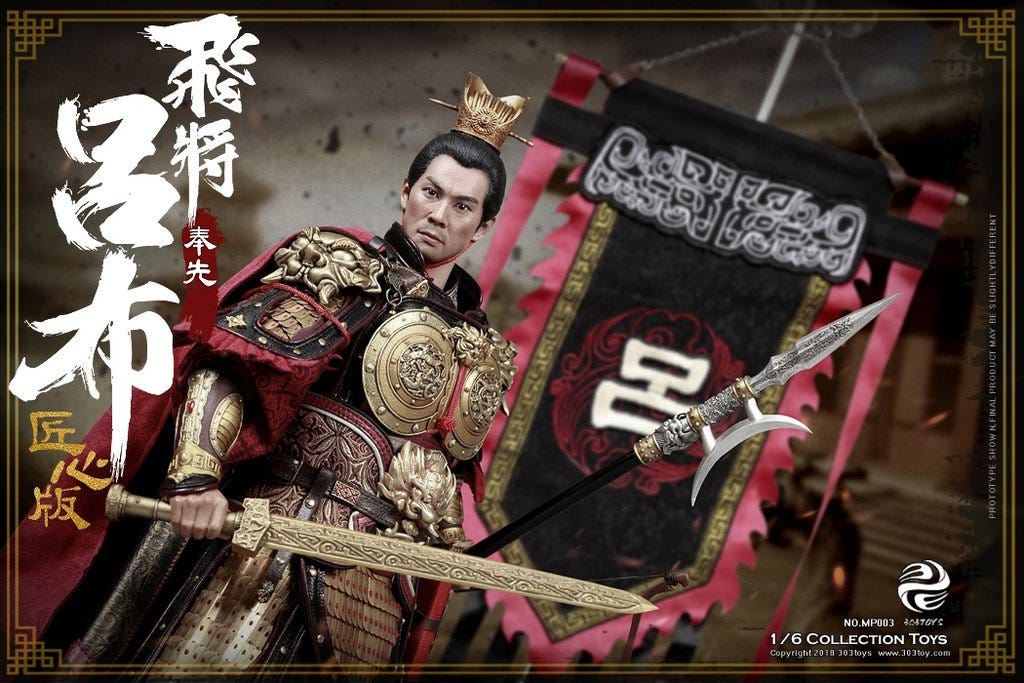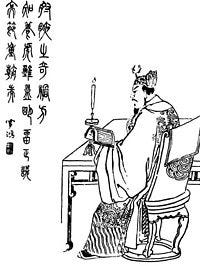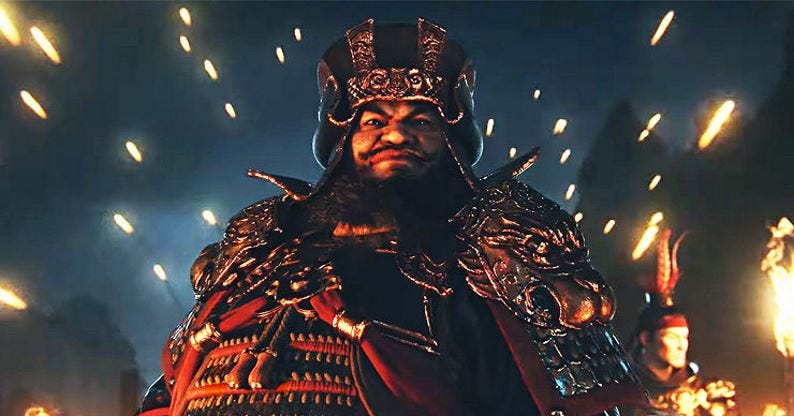The Chinese Achilles and The Need for Loyalty (1 of 4)
Why even Lü Bu the G.O.A.T. couldn't survive on skill alone
Conscripts and captains alike shuddered at his approach. Astride his rare Ferghana horse, Lü Bu was a blood-red streak trailing dust and destruction. He scythed through the battlefield. His halberd shivering spears and severing heads. A veritable god of war whom all the warlords of the Three Kingdoms period desired at one point to have at their side. Legend even has it that three of the period’s greatest champions once fought him together and failed to take him. Mercurial in temperament yet unbeatable in combat, he was the reincarnation of Achilles in China.
For his unparalleled martial prowess, he was nicknamed, “The Flying General.” But this prowess led to an outsized ego harboring little gratitude for anyone. Born in an age of lawlessness, he let no law govern his person. Instead, a repetitive cycle of resentment and betrayal garnered him the less-flattering moniker, “Bastard of Three Fathers.”
At some point, everyone dreams about being the best. Every kid has pitched an imaginary World Series no-hitter or sunk the NBA Playoffs buzzer-beater or knocked out the heavyweight champ from their bedroom. Well, if you had lived in the 2nd Century, the question of “Who’s the baddest MFer in China?” would have been answered with, “Among steeds, Red Hare, among men, Lü Bu.”
Like many greats, Lü Bu was a young prodigy. Born on the frontiers of the empire in modern-day Inner Mongolia, he distinguished himself as an expert marksman and rider amongst peoples renowned for archery and horsemanship. However, skilled as he was, none would know Lü Bu today without provincial inspector Ding Yuan.
By all accounts, Ding Yuan was a kind mentor who treated Lü Bu like a son. Also coming from nothing, Ding Yuan won his promotions by throwing himself headfirst into skirmishes against escaped criminals and fierce bandits. Seeing much of himself in the frontier wild child, Ding Yuan kept the boy close by making him his Chief Secretary. By the time Ding Yuan marched on the capital to oppose China’s corrupt eunuchs, he did so with Lü Bu by his side.
Unfortunately, when they got to the city gates, the general who was to lead their uprising had already been murdered and a new warlord, Dong Zhuo, had crushed the eunuchs and seized control of the throne.
Here, Lü Bu faced his first temptation. Remember that undisputed declaration that “Lü Bu” was the best warrior and “Red Hare” was the best horse? Dong Zhuo’s cronies proposed to unite the two. In addition to dazzling Lü Bu with more wealth than the frontier bumpkin had ever seen, they gave him the legendary steed. Red Hare was the greatest war machine of his time. He could leap moats, vault barricades, and cover a thousand li in a day. Astride him, Lü Bu would gain the air necessary to be crowned “Flying General”. As far as signing bonuses go, sneaker lines, alpine training facilities, and undetectable steroids don’t even come close. And more would be his, they said. Just bring Ding Yuan’s army, and Ding Yuan’s skull, to Dong Zhuo’s side.
And so it was that one morning nearly two millennia ago, a fearsome young man regaled in full armor trailing a detail of resplendent-if-slightly-nervous-looking soldiers strode up to the gates of the imperial palace with a gift box under his arm. In it—blood still seeping into its silk wrapper—was Ding Yuan’s severed head.
Overjoyed that the great Lü Bu had not only killed his nemesis but would be joining his forces, Dong Zhuo immediately appointed Lü Bu Cavalry Commandant and adopted him as a foster son. Finally, Lü Bu, chief secretary to a magistrate from the sticks, was joining the big leagues.
While it’s no wonder why Lü Bu took the deal, how did Ding Yuan let it happen? Perhaps he saw more of himself in the frontier wild child than was there. Or maybe, being the product of a more virtuous time, Ding Yuan couldn’t conceive of such treachery. The provincial inspector never let a responsibility go unfulfilled. Always wading into the front, Ding Yuan risked everything for his comrades. Lü Bu only ever fought for himself.
What Ding Yuan knew implicitly, Lü Bu would disregard to his detriment: What separates the kids from the grown-ups, the pretenders from the pros, is the knowledge of what skill actually means. Every master was once a student. Every Michael Jordan has his Phil Jackson, every Bruce Lee his Ip Man, every Mike Tyson his Cus D’Amato. And it is crucial that we who get good at anything meet our obligations to the people who made us good. In Chinese thinking, mutual care between mentor and mentee is virtually no different from parent and child. This is why the murder of fathers by sons so worried Confucius. For when these bonds are violently severed, all hell breaks loose.
Next week, we’ll see how Lü Bu’s new dad was far worse than his old one and follow the events that led to the world’s greatest warrior committing patricide a second time.
Read Part 2 Here.
Thanks for reading!




